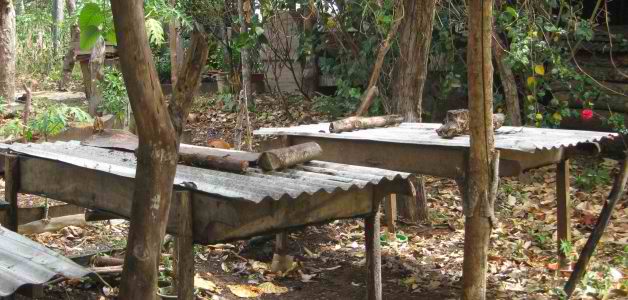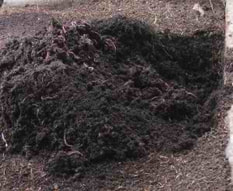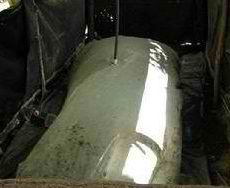COMPAS DE NICARAGUA
BIOGAS INFORMATION
The Many Advantages of Biogas Systems
|
With each biogas system we build, we are working to support rural families in Nicaragua and at the same time, helping to save rainforests and reduce our carbon footprint.
Bio-gas is generated when bacteria degrade biological material in the absence of oxygen, in a process known as anaerobic digestion. Bio-gas, a mixture of methane and carbon dioxide, is a renewable fuel produced from waste treatment. Bio-gas provides a clean, easily controlled source of renewable energy from organic waste materials for a small labor input, replacing firewood or fossil fuels (which are becoming more expensive as supply falls behind demand and which contribute to global warming). During the conversion process pathogen levels are reduced and plant nutrients made more readily available, so the sludge produced provides a better fertilizer for crops. |
|
Beneficiaries of the Biogas systems strain the liquid sludge byproduct in a screen. The liquid that falls through the screen is known as “biol”, and apart from being a potent, natural insecticide and beneficial fertilizer spray, it has also been clinically proven to be the most successful fungicide against “roya” (coffee rust); the coffee fungus that is the most detrimental coffee disease.
The solids from the straining process are used for worm composting. Solids are fed to composting (red) worms who digest the organic material and refine it. Nutrients, including minerals, are reduced to their most usable form. The castings have a neutral pH of 7.0. Worm castings make soil more absorbent, making moisture more consistently available to plants and preventing soil from completely drying out. Worms also introduce uncountable numbers of beneficial microbes and bacteria into the finished product, guaranteeing the healthiest soil possible. |
Benefits of biogas systems
|
Destroy methane, the highly destructive greenhouse gas, so it does not go into the atmosphere and contribute to global warming
Provide clean-burning fuel for stoves and lamps instead of using wood or dung which lose their soil building and fertilizing value when burned Reduce labor, since men and women now spend one day a week to collect a backbreaking 60 – 80 lb. load of scarce firewood. Save families money, labor and time needed to purchase, search for and split firewood Protect the remaining forests by reducing the need to gather firewood. Reduce respiratory disorders and eye irritation caused by smoke from cooking with firewood which especially affects women and their small children. Yield more potent sludge fertilizer than the original manure waste These low tech systems are easily installed and maintained, and the primary material (cow or pig manure) is readily available. |
Luis Mercado, beneficiary of a bio-gas system, said that he will save at least a month’s worth of work in searching for and splitting firewood now that his family has a bio-gas system.
“I spend about two months a year searching for, splitting, stacking and keeping the firewood dry during the rainy season. It (the biogas system) not only saves me time, but the best thing is that it eliminate the firewood smoke that not only affects my wife Lizeth, but also the children. The smoke affects their eyes and respiratory systems,” he said |
CONTACT US
|
FOLLOW ME
|




